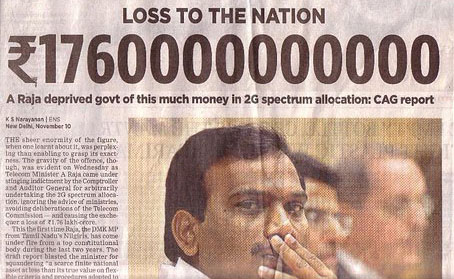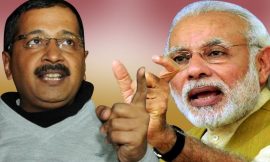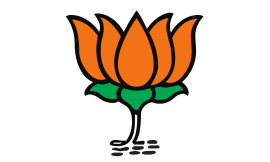- Jeep scandal(1948) – Rs.80 Lakhs:

India’s corruption graph begins. V. K. Krishna Menon, then the Indian high commissioner to Britain, bypassed protocol to sign a deal worth Rs 80 lakh with a foreign firm for the purchase of army jeeps. The case was closed in 1955 and soon after Menon joined the Nehru cabinet.

S.A. Venkataraman, then the secretary, ministry of commerce and industry, was jailed for accepting a bribe in lieu of granting a cycle import quota to a company.
- BHU funds misappropriation (1956)- Rs. 50 Lakhs:

In one of the first instances of corruption in educational institutions, Banaras Hindu University officials were accused of misappropriation of funds worth Rs 50 lakh.
- The Mundhra scandal –1958 – Rs.1.2 Crore:

The Life Insurance Corporation of India, under the Centre’s pressure, bought shares worth Rs 1.2 crore in firms owned by Haridas Mundhra to bail him out of a crunch. The case compelled T.T. Krishnamachari to resign as finance minister.
- Teja Loans (1960)– Rs.22 Crores:

Shipping magnate Jayant Dharma Teja took loans worth Rs 22 crore to establish the Jayanti Shipping Company. In 1960, the authorities discovered that he was actually siphoning off money to his own account, after which Teja fled the country.
- Kairon scam (1963):

Pratap Singh Kairon became the first Indian chief minister to be accused of abusing his power for his own benefit and that of his sons and relatives. He quit a year later.
- Biju Patnaik‘s Own Goal (1965):

Orissa Chief Minister Biju Patnaik was forced to resign after it was discovered that he had favoured his privately-held company Kalinga Tubes in awarding a government contract.
- Maruti scandal (1974):

Well before the company was set up, former prime minister Indira Gandhi’s name came up in the first Maruti scandal, where her son Sanjay Gandhi was favoured with a licence to make passenger cars.
- Madhav Singh Solanki Exposé (1992):

At the World Economic Forum, Madhavsinh Solanki, then the external affairs minister, slipped a letter to his Swiss counterpart asking their government to stop the probe into the Bofors kickbacks. Solanki resigned when India Today broke the story.
- IOC-Kuo Oil deal (1976)- Rs.2.2 Crores:

The Indian Oil Corporation signed a Rs 2.2-crore oil contract with a non-existent firm in Hong Kong and a kickback was given. The petroleum and chemicals minister was directed to make the purchase.
- Antulay Cement Scam (1981)- Rs.30 Crores:

With the exposure of this scandal concerning A.R. Antulay, then the chief minister of Maharashtra, The Indian Express was reborn. Antulay had garnered Rs 30 crore from businesses dependent on state resources like cement and kept the money in a private trust.
- HDW submarine deal (1987)- Rs.20 Crores:

HDW, the German submarine maker, was blacklisted after allegations that commissions worth Rs 20 crore had been paid. In 2005, the case was finally closed, in HDW’s favour.
- Bofors scandal (1987)- Rs. 64 Crores:

A Swedish firm was accused of paying Rs 64 crore to Indian bigwigs, including Rajiv Gandhi, then the prime minister, and several others including a powerful NRI family named the Hindujas, were accused of receiving kickbacks from Bofors AB for winning a bid to supply India’s 155 mm field howitzer. The Swedish State Radio had broadcast a startling report about an undercover operation carried out by Bofors, Sweden’s biggest arms manufacturer, whereby $16 million were allegedly paid to members of PM Rajiv Gandhi’s Congress.
- St.Kitts Forgery case (1989)- Rs. 45 Crores:

An attempt was made to sully V.P. Singh’s Mr Clean image by forging documents to allege that he was a beneficiary of his son Ajeya Singh’s account in the First Trust Corp. at St Kitts, with a deposit of $21 million.
- Airbus Scandal (1990)- Rs. 2.5 Crores/week:

Indian Airlines’s (IA) signing of the Rs 2,000-crore deal with Airbus instead of Boeing caused a furore following the crash of an A-320. New planes were grounded, causing IA a weekly loss of Rs 2.5 crore.
- Stock Market Scam (1992)– Rs.5000 Crores:

Harshad Mehta manipulated banks to siphon off money and invested the funds in the stockmarket, leading to a crash. The loss: Rs 5,000 crore.
- Sugar Import scam (1994)- Rs.650 Crores:

As food minister, Kalpnath Rai presided over the import of sugar at a price higher than that of the market, causing a loss of Rs 650 crore to the exchequer. He resigned following the allegations.
- Indian Bank loan scandal (1992)- Rs.1300 Crores:

Aided by M. Gopalakrishnan, then the chairman of the Indian Bank, borrowers-mostly small corporates and exporters from the south-were lent a total of over Rs 1,300 crore, which they never paid back.
- JMM MP’s bribery case (1995)- Rs.30 Lakhs:

Jharkhand Mukti Morcha leader Shailendra Mahato testified that he and three party members received bribes of Rs 30 lakh to bail out the P.V. Narasimha Rao government in the 1993 no-confidence motion.
- In a pickle (1996)- Rs.10 Lakhs:

Pickle baron Lakhubhai Pathak raised a stink when he accused former prime minister P.V. Narasimha Rao and godman Chandraswami of accepting a bribe of Rs 10 lakh from him for securing a paper pulp contract.
- The Great Telecom Scam (1996)- Rs. 1.6 Crores:

Former minister of state for communication Sukh Ram was accused of causing a loss of Rs 1.6 crore to the exchequer by favouring a Hyderabad- based private firm in the purchase of telecom equipment. He, along with two others, was convicted in 2002.
- Fodder Scam (1996)– Rs. 950 Crores:

In this corruption scandal worth Rs.900 crore, an unholy nexus was traced involved in fabrication of “vast herds of fictitious livestock” for which fodder, medicine and animal husbandry equipment was supposedly procured. The accountant general’s concerns about the withdrawal of excess funds by Bihar’s animal husbandry department unveiled a Rs 950-crore scam involving Lalu Prasad Yadav, then the state chief minister. He resigned a year later.
- UREA SCAM (1996)- Rs.133 crores:

C.S. Ramakrishnan, MD, National Fertiliser, and a group of businessmen close to the P.V. Narasimha Rao regime fleeced the government and took Rs 133 crore from the import of two lakh tonne of urea, which was never delivered.
- Hawala scandal (1996)- Rs.810 Crores:

The scandal surfaced following CBI raids on hawala operators in Delhi in 1991. But it was S.K. Jain’s diaries that had heads rolling. The Hawala case to the tune of $18 million bribery scandal, which came in the open in 1996, involved payments allegedly received by country’s leading politicians through hawala brokers. From the list of those accused also included Lal Krishna Advani who was then the Leader of Opposition. Thus, for the first time in Indian politics, it gave a feeling of open loot all around the public, involving all the major political players being accused of having accepted bribes and also alleged connections about payments being channeled to Hizbul Mujahedeen militants in Kashmir.
- Cricket Match Fixing (2000):

Mohammed Azharuddin, till then India’s cricket captain, was accused of match-fixing. He and Ajay Sharma were banned from playing, while Ajay Jadeja and Manoj Prabhakar were suspended for five years.
- Tehelka Sting (2001):

Tehelka, an online news portal, used spycams to catch army officers and politicians accepting bribes, in their sting operation called Operation Westend. Investigative journalism turned another corner in the country.
- Stockmarket Scam (2001)- Rs 1,15,000 crore:

The mayhem that wiped off over Rs 1,15,000 crore in the markets in March 2001 was masterminded by the Pentafour bull Ketan Parekh. He was arrested in December 2002 and banned from acccessing the capital market for 14 years.
- Home Trade’s scam(2002)- Rs. 600 Crores:

Under the pretext of gilt trading, Rs 600 crore was swindled from over 25 cooperative banks in Maharashtra and Gujarat by a Navi Mumbai-based brokerage firm Home Trade. Sanjay Agarwal, CEO of the firm, was arrested in May 2002.
- Telgi fake stamp paper scam (2003)- Rs. 30,000 Crores:

The sheer magnitude of the racket was shocking-it caused a loss of Rs 30,000 crore to the exchequer. Disclosures of the mastermind behind it, Abdul Karim Telgi, implicated top police officers and bureaucrats. Telgi had mastered the art of forgery in printing duplicate stamp papers and sold them to banks and other institutions. The tentacles of the fake stamp and stamp paper case had penetrated 12 states and was estimated at a whooping Rs. 30000 crore plus. The Telgi clearly had a lot of support from government departments that were responsible for the production and sale of high security stamps.
- Oil-for-Food Scandal(2005):

K. Natwar Singh was unceremoniously dropped from the Cabinet when his name surfaced in the Volcker Report on the Iraq oil-for-food scam.
- IPO Scam 2006– Rs. 61 Crores:

A well structured game played by the absolute opportunists consisting of intermediaries, financiers and bank employees, who make a lot of money by controlling shares meant for retail investors in Initial Public Offer (IPO)
- Hassan Ali Scam (2008) – Rs. 50,000 Crores:

Swiss connections of the horseowner came to light during raids. A laptop seized contained a list of 10 Swiss Bank accounts reportedly stashed with over Rs 50,000 crore-all of it unaccounted for.
- Satyam scandal (2009)- Rs. 24,000 Crores

A web of 356 investment companies was used to allegedly divert funds from Satyam. These companies had several transactions in the form of inter-corporate investments, advances and loans within and among them. The cash so raised was used to purchase several thousands of acres of land across Andhra Pradesh to ride a booming realty market.
- Madhu Koda mining scam (2009)- Rs.4,000 Crores

During raids on Jharkhand CM’s premises, the IT department had claimed to has found evidence of hawala transactions and illegal investments running into more than Rs 4,000 crore.
- 2G spectrum scam (2009) – Rs. 1,76,000 Crores

The 2G spectrum scam involved politicians businessmen and government officials in India illegally undercharging mobile telephony companies for frequency allocation licenses, which they would then use to create 2G subscriptions for cell phones. The shortfall between the money collected and the money which the law mandated to be collected is estimated to be Rs 1,76,645 crore, as valued by the Comptroller and Auditor General of India. Former Telecom minister A Raja – who according to the CAG, has evaded norms at every level as he carried out the dubious 2G license awards in 2008 at a throw-away price which were pegged at 2001 prices.
- Rice export scam (2009)- Rs. 2,500 Crores

This massive scam was in export of high-quality Basmati rice to Iran, running into over Rs 1,000 crore, in which the commodity was fraudulently diverted mid-sea to Dubai. Over two lakh metric tonnes of Basmati rice was illegally offloaded in Dubai in the last over a year instead of in Bandar Abbas in Iran.
- Orissa mine scam (2009)- Rs. 7,000 Crores

The state that tops the poverty charts did too little to stop the plunder. Among the biggest defaulters are the who’s who of the mining industry, including Rungta Mines, Essel Mines, Sarada (Jindal Steel & Power Limited), Arjun Lodha Mines, Orissa Mining Corporation, Sirajuddin & Co, Adhunik Metalics and B D Patnaik Mines. Licences of mining companies had expired in 2000, yet they continued to loot the resources.
- Commonwealth Games scam (2010) – Rs. 70,000 Crores

It is estimated that out of Rs. 70000 crore spent on the Games, only half the said amount was spent on Indian sportspersons. The Central Vigilance Commission, involved in probing the alleged corruption in various Commonwealth Games-related projects, has found discrepancies in tenders – like payment to non-existent parties, will-ful delays in execution of contracts, over-inflated price and bungling in purchase of equipment through tendering – and misappropriation of funds.
- Andhra Pradesh Land Scam (2011)- Rs. 200 Crores

Allotment of land by the AP Government during 2006-11 was characterised by grave irregularities, involving allotment in an ad-hoc, arbitrary and discretionary manner to private persons and entities at very low rates, without safeguarding the financial and socio-economic interests of the state.
- Karnataka Wakf Board Land Scam (2012)- Rs. 20,000 Crores

In March of 2012, Anwar Maniapddy, the chairman of Karnataka State Minorities Commission submitted a sensational report which alleged 27,000 acres of land, which was controlled by Karnataka Wakf Board had been allocated illegally or misappropriated. The value of land which was misappropriated was in tune of 1.5 to 2 lakh crore rupees. The land managed by Wakf board, a charitable trust, is typically donated to under-privileged and poor people of Muslim community. However, the report alleged that nearly 50 percent of the land owned by Wakf board was misappropriated by Politicians and Board members in conjunction with real estate mafia at fraction of actual land cost.
- Indian coal allocation scam (2012)- Rs. 1,85,591 Crores

While many think that 2G scam was the biggest one in size in India, this coal allocation scam dwarfs it by the amount involved. This scam is in regards to Indian Government’s allocation of nation’s coal deposit to PSU’s and private companies. The scam happened under Manmohan Singh government and came out in 2012. The basic premise of this scam was that wrongful allocation of Coal deposits by Government without resorting to competitive bidding, which would have made huge amounts to the Government (to tune of 1.86 Lakh crore). However, the coal deposits were allocated arbitrarily.
- Abhishek Verma scam (arms deal) (2012)– Rs.80,000 Crore

Defense scandal caused by an American attorney who turned whistleblower after hacking into emails and documents retained on the US based servers of arms dealer Abhishek Verma who is globally known as ‘Lord of War’ and his wife former Miss Universe Romania Anca Verma’s global weapons companies SIG SAUER and GANTON.
- Iron ore freight scam (2013)- Rs. 29,236 Crores

Iron ore freight evasion scam led to a loss of Rs 29,236 crore for Indian Railways between 2008 and 2013, the Comptroller and Auditor General of India (CAG) has said. The overall loss includes freight evasion of Rs 12,722 crore and non-imposition of penalty to the tune of Rs 11,418 crore, owing to partial or non-submission of documents, as well as submission of invalid documents, besides a penalty of Rs 5,095 crore for diversion of the iron ore transported at the domestic rate for trading.
- Saradha Group financial scandal (2013)– Rs. 40,000 Crores:

Financial scam caused by the collapse of a Ponzi scheme run by Saradha Group, a consortium of over 200 private companies that was believed to be running collective investment schemes popularly but incorrectly referred to as chit funds.
- Delhi Jal Board scam (2014)- Rs. 10,000 Crores

The Rs 400 crore tanker scam took place between 2010-2013 when Congress leader Sheila Dikshit was the chief minister of Delhi. The first tender was allocated and cancelled. Then, four fresh tenders worth Rs 637 crore was issued. These tankers were hired to supply water to those places in capital where Delhi Jal Board (DJB) has no network of its pipeline. The government had allegedly ignored the rules framed for the appointment of consultant in the matter. The opposition had then accused the government of not following the laid procedure and indulging in favouritism in appointing the first consultant.
- Odisha land scam (2014)- Rs. 52,000 Crores

Land fraudulently taken away by the influential people and land mafias. Nearly 1,400 acres of land has been encroached in the capital city. Around 761 acres has been encroached in Gothapatana, 250 acres in Malipada and the rest in other parts of the city. Similarly, 1,200 acres of land have been illegally taken away by influential people in Puri, 1,800 acres of land in the industrial hub Kalinga Nagar and 400 acres in Cuttack city.
- NTC land scam (2015)- Rs. 709 Crores

The sale of government-owned land to the private company at a price of Rs 29.35 crores led to a loss of Rs 709.27 crore to the government exchequer, as the market value of the prime pre-independence era property in Mumbai’s Worli area was much higher.




